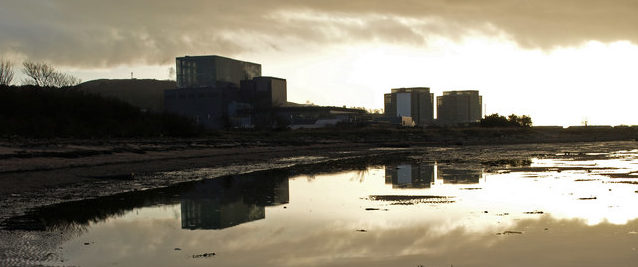Cracks that are spreading in two ageing nuclear power reactors at Hunterston in North Ayrshire have delayed plans to reopen them until 2019.
EDF Energy has postponed the scheduled restart for reactor three from 18 December until 21 February, and the restart of reactor four from 30 November until 14 January. Reactor three has been closed down since 9 March 2018, and reactor four since 2 October.
The shutdowns are to enable the reactors’ graphite cores to be inspected for cracks which could jeopardise nuclear safety. The scheduled date for reopening reactor three, the oldest in EDF’s fleet, has been repeatedly postponed as more cracks have been found.
EDF confirmed the delays to the news agency, Reuters, the day after The Ferret revealed that more than 350 cracks had been detected in reactor three, breaching its operating safety limit. EDF is now asking the UK government’s Office for Nuclear Regulation (ONR) to relax the limit to allow the reactor to start.
In a “market update” EDF said that the reactor outages were being prolonged to give more time to consider information on the growing number of cracks. “We are preparing to present a safety case for return to service of reactor three to the regulator, the ONR,” a company spokeswoman said.
“We have updated (the outages) to reflect the further time needed for the preparation and assessment of the safety cases.”
The two reactors at Hunterston B nuclear power station started generating electricity in 1976 and can provide up to 20 per cent of Scotland’s electricity. They were originally due to close in 2006, but EDF is hoping to keep them going until at least 2023.
Critics welcomed the delays. They were recognition of the “seriousness” of the cracking problems, said Dr Ian Fairlie, a radioactivity consultant who advises local groups opposed to Hunterston restarting.
He has warned of the risk of a major nuclear accident spreading radioactive contamination over Glasgow and Edinburgh. “At the very least, people living in the central belt of Scotland can breathe a bit easier for the next few months as the threat of an imminent restart has been lifted for two more months,” he said.
Glasgow Labour councillor, Bill Butler, of the group of Nuclear-Free Local Authorities (NFLA) in Scotland, said that EDF’s decision to delay restarting the reactors followed “considerable pressure” from ONR, NFLA and others. “NFLA remains very concerned about the reopening of reactor three at Hunterston B,” he said.
“We are hoping to meet with the UK chief nuclear inspector shortly to discuss our concerns and satisfy ourselves that public safety is the core factor in the final decision over this reactor restarting or not. EDF must be worried, and so they should be, given likely similar problems would be expected at their other reactors in England.”
The safety implications of reactor three’s 350 cracks were raised with the First Minister, Nicola Sturgeon, in the Scottish Parliament by the Green MSP for the West of Scotland, Ross Greer.
Extract from First Minister’s questions
“This is a very important issue of safety and it is essential that the strictest safety and security standards are met at all nuclear installations,” said Sturgeon in response.
“We are of course aware of the situation at Hunterston B and indeed are in regular contact with EDF, the Office for Nuclear Regulation and with local stakeholders in the neighbouring communities for whom of course this is a matter of concern. The ONR is not directly accountable to the Scottish Government but we do expect it to ensure that the nuclear industry maintains the highest standards.”
Sturgeon added: “We understand that reactor three will remain offline while EDF work with the regulator to ensure that the longer term safety case reflects the findings of the recent inspections and the ONR is clear that the reactor cannot be restarted until they are satisfied it is safe to do so.”
Greer pointed out that Hunterston was now well beyond what should have been its operational lifespan. “This isn’t the first shutdown caused by serious safety concerns but it should be the last,” he told The Ferret.
“I challenged the First Minister to support an environmental impact assessment before the plant is brought back online, one which compares the potential impact of extending the life of an old reactor with supplying energy from alternative sources such as renewable energy, and involves the public in the decision-making process.”
Safety was not the only area where residents must be consulted, Greer argued. “I also challenged the Scottish Government to ensure that a substantial and urgent transition plan is developed to ensure that another community is not left behind by the inevitable and imminent closure of a degrading power station to which so much local employment is tied,” he said.
“While her responses to both requests were far from clear commitments, there should be more than enough common ground for us to ensure the safety and prosperity of the community in both the short and long term.”














